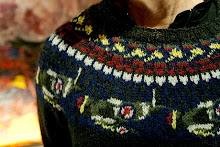Farley Mowat was a writer of dubious renown in our house. Dad’s father — an RCMP officer in the territories in the forties and fifities — felt that
People of the Deer
was off the mark.
When I got around to studying the Italian campaign in the Second World War though, Mowat’s memoir
And No Birds Sang
was a terrific resource. Mowat’s Hastings and Prince Edward Regiment spent a good deal of time at the pointy end as the Allies took Sicily and then fought their way up the ankle of Italy in 1943. Mowat gives a terrific account of the key battles — Grammichele, Assoro and Nissoria — in Sicily, which proved an education for both the invaders and the defenders ( read: the Germans, who, for the record, were also invaders.)
The book opens when war is declared in 1939, Mowat enumerates the ways he tries to get into the air force before he accepts his fathers help getting into the Hasty Pees, the same outfit his father served in the first go round. For 45 pages, until Mowat leaves for Sicily in 1943, the book reads like (flighty) school boy hijinks. Throughout the campaign in Sicily there is a dreamlike quality. Over the course of a few pages Squib goes from identifying birds by their song to identifying guns by their various whistles, whines and bangs.
However in Mainland Italy, as winter descends and the Germans refuse to withdraw it becomes both real and nightmarish. It comes down to Squib facing what he calls the Worm That Never Dies, the fear of fear itself. Everyone feels it and everyone sympathizes, usually by pouring rum ration into the man most afflicted.
Mowat took some pretty literary liberties with the memoir. There are only two distinct voices in the book: Mowat’s, rather Squib’s as he is called by the Regiment, and Captain Alex Campbell of Able Company, the toughest, angriest, Hun-hatingest man in the Hasty Pees. Everyone else starts to sound, well, if not like Squib, like a character in a Mowat story. In the end, Mowat takes liberties with Alex too.
Even letters from Mowat’s father sound like a mature man talking to his younger self.
And No Birds Sang was published in the ‘seventies when Mowat was in his fifties. So that could be the case. On the other hand father and son could very well be that similar. At some point I’ll get around to the second volume,
My Father’s Son
.
It would be fair to describe
And No Birds Sang as one of — if not —
the Canadian Second World War memoirs. But Squib was by no means an intrepid leader or an instinctual soldier — Alex probably would have been. But that maybe what makes it so Canadian.
Stray Observations
- Shout out to the Mantova Division! — It was one of six divisions to go on to fight the Germans on the Allied side. But we’ll cover that in more detail when I get around to the 300 books I have on that topic.
- Spoiler alert — I had the good fortune to go on a
Canadian Battlefields Foundation study tour to Italy in 2003. I seem to remember that Alex Campbell was killed by a booby trap as the Hasty Pees cleared out Ortona. Not that I would expect Mowat to let the facts get in the way of a good story.
-My Grandfather fought in Italy, he was with the service corp. Everytime Squib get’s in a jeep, I think he might have had something to do with it.
-I’m not sure how I would have gotten through this book if it weren’t for wanting to to write about it. I have barely made it as far as the straits of Messina before but I still believe it’s brilliant and I recommend it often.

